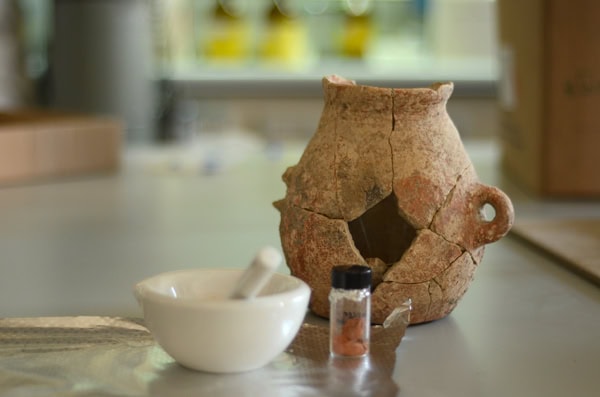
[Image above] Samples from ancient pottery uncovered in Galilee contain traces of the world’s oldest olive oil. Credit: Israel Antiquities Authority
Olive oil has a prominent place in my kitchen—and likely in yours, thanks to the popularity of 30-minute-meal maven Rachael Ray (who uses and praises EVOO regularly), clean eating, and the Mediterranean diet.
But olive oil isn’t a 21st century thing—it is believed that ancient peoples were pressing oil from olives all the way back in 4500 BC, and its production a vital part of the Egyptian, Phoenician, Greek, and Roman economies.
A recent discovery in Israel, however, shows that olive oil likely was a part of diets and daily routines as early as the sixth century BC.
Much like the accidents turned eurekas that occur in the lab, this discovery might never have happened if not for the need to expand Highway 79, which runs through an archaeologically rich portion of Galilee.
During the 2011–2013 dig at Ein Zippori in northern Israel, a team from the Israel Antiquities Authority unearthed ancient clay pots that contained the residue of equally ancient—some 8,000 years ancient—olive oil. Their findings, published in the Israel Journal of Plant Sciences, support earlier research into the domestication of the olive tree, and researchers believe that olive oil was not only an important part of diet but also possibly used in primitive lighting.
According to Ianir Milevski and Nimrod Getzov, who oversaw the excavation team, “This is the earliest evidence of the use of olive oil in the country and perhaps the entire Mediterranean basin.”
With the assistance of Dvory Namdar from Hebrew University of Jerusalem, they tested the organic remains contained in nearly two dozen of the early Chalcolithic-era pottery. Samples revealed the remains to be olive oil that had resided in the ancient vessels, two of which date back to 5800 BC.
Further, in comparing the oil to “modern” year-old oil, they found a “strong resemblance … indicating a particularly high level of preservation of the ancient material, which had survived close to its original composition for almost 8,000 years.”
While the thought of 8,000 year-old olive oil isn’t exactly appetizing, the discovery is nonetheless exciting for the Milevski/Getzov-led team and EVOO lovers everywhere.
Want to learn more about the artistic side of ceramics? Consider adding ACerS Art, Archaeology, and Conservation Science Division to your membership.
The paper is “Olive oil storage during the fifth and sixth millennia BC at Ein Zippori, Northern Israel” (DOI:10.1080/07929978.2014.960733).
Author
Jessica McMathis
CTT Categories
- Art & Archaeology
- Material Innovations
- Weekly Column: “Other materials”
Related Posts
Other materials stories that may be of interest for December 17, 2025
December 17, 2025
Celebrating the US Semiquincentennial: Ohio Creativity Trail
December 16, 2025
Other materials stories that may be of interest for December 10, 2025
December 10, 2025




